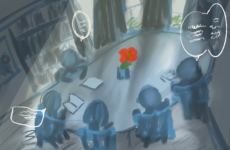On the campuses of both boarding schools and universities everywhere, administrators have been challenged with the task of responding to the Trump administration’s swift and frightening promises, delivered by executive orders or by tweets. With haste, Wesleyan University pronounced itself a “sanctuary campus,” aiming to protect undocumented students from the threat of deportation. Wesleyan’s policy prohibits staff from assisting federal authorities in any deportation raids and, in theory, prohibits campus resources like Public Safety from assisting federal deportation attempts in any capacity. The entire California State University system echoed Wesleyan’s sentiments, vowing to “not enter into agreements with state or local law enforcement agencies, Homeland Security or any other federal department for the enforcement of federal immigration law” unless forced.
Even some of our peer schools have addressed the pressure on institutions to protect students from the onslaught of the Trump administration’s reprehensible engagements that are both threatening to students and incongruous with many schools’ core values. On February 1, John Palfrey, headmaster of Phillips Andover Academy, acknowledged the “merit of schools committing to be ‘sanctuaries’ for students” and committed to ensuring that Andover students “know that they will have every protection [the school] can manage.” On the same day, our headmaster announced the formation of the Current Events Resource Group, whose mission to “[coordinate] resources, both on and off campus, to support members of the community” is roughly analogous to Palfrey’s commitment. The Resource Group moved quickly to organize a visit from Michael Wishnie P ’16, a Clinical Professor of Law at Yale Law School. Mr. Wishnie was responsible for the first successful challenge to Trump’s executive order blocking the entry of refugees into the United States. He was invited to answer students’ questions and advise those feeling unsafe.
Besides organizing this event, however, the Resource Group hasn’t fully demonstrated by which concrete means it intends to fulfill the four tenets of its mission. The group must clarify any remaining ambiguities in order to maximize its utility. It must also swiftly assume a strong stance in response to the changes taking place nationally.
The Resource Group will need to first expand upon its purpose from just what was introdued by Dr. Curtis on the day of the group’s announcement. What exact “resources” will the Resource Group mobilize to support students? At Mr. Wishnie’s lecture, one of the group’s members confirmed the existence of an immigration lawyer with whom administrators and students could confer. The group ought to inform the whole school on these and other resources — not only to ensure their appropriate use, but also to show the School’s willingness to prioritize its vulnerable students’ wellbeing. By concretely demonstrating the School’s commitment to “leverage our existing resources and maximize opportunities to help community members,” the group will garner more legitimacy from the Choate community and aid its cause.
The Resource Group should also develop a stronger voice and position immediately in response to the most pressing issues emerging from the White House. In addition to inviting professors and speakers to unpack and comment on policies like the Muslim Ban, the Resource Group itself should take greater initiative to offer students accurate information on pertinent national proceedings. During times in which the President seems unable to speak for a minute without misinforming citizens, the school ought to empower us with the facts. The dizzying speed of America’s change and the uncertainty of the nation’s future has already made many students feel disenfranchised; therefore, as part of its mission to support our community, the Resource Group should officially inform students about the evidence (or lack thereof) behind Trump’s claims that a terror attack took place in Sweden or that his campaign had no contact with Russian officials, either by school-wide email or by announcements at school meetings or community lunches. Making information like this available to the community acts as the first step in dismantling the paralyzing confusion and fear with which so many of us have become accustomed — and it is an act that would certainly “support members of the community.”
The Current Events Resource Group represents a commendable effort on the administration’s part to preserve our learning environment from ostensible instability at the national level. In the first few weeks after its announcement, the group has shown the campus its commitment toward being proactive and pragmatic. I hope that the Resource Group will go many steps further and explain more concretely its action plan while also taking more initiative to be a source of credible information regarding current events. By engaging the community in this way, the Resource Group can assume its significant and relevant role as a lighthouse in navigating these dark times.




